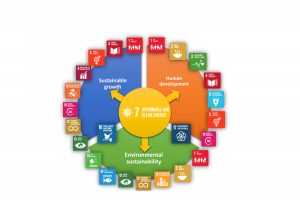There are clear proofs the earth is warming greatly, and everybody including scientists and politicians who in the past engaged in arguments over its reality can no longer be wrong about the collective effects this phenomenon is exerting on human societies. Though the world has jointly agreed to work to reverse this trend, governments of countries like the United States do not feel up to this as recently evidenced in its departure from the Paris Agreement. This has prompted questions as to why Nigeria should keep faith with the Pact, writes OGN.
The United States, Nicaragua and Syria currently share the uncommon honour of being the only countries on earth to decline accenting to the 2015 Paris Accord, an exciting piece of deal the world sat down to agree on to save her future after years of debates.
Even though the US played an integral part to the Accord’s existence, President Donald Trump recently withdrew his nation’s previous obligation to the pact, citing the unfavourable constraints it placed on the US economy as the driver to his decision.
He did this despite obvious signs that the earth is warming, and a time prior debates about the realities of climate change are swiftly moving away from whether humans are causing warming, toward questions of how best to respond to its impacts.
When President Trump chose to stand-down the US from the pact, and renegotiate a fair deal for the US, the news of his decision indeed sent shockwaves through the global community which universally agreed to the pact, with some commentators theorizing that it could potentially wreck the Accord.
These fatalist views however are not likely to be the case since the earliest the US can withdraw from its obligations to the Accord would be November 2020, and even then the support of 194 other countries should prop it well up.
At the home front, Nigeria has also had its share of scoffers on the pact, some of whom have suggested a withdrawal from the agreement on the grounds that the ‘big boy’ America with its industrialised status has done that, but common-sense should dictate that what is good for America is not necessarily good for Nigeria.
Why the Paris Agreement?
In his video ‘Climate Change 101’ on National Geographic channel, American science communicator, Bill Nye clearly stated that climate change was a real and serious issue, and thus needed to be fixed.
Based on this, the impacts of climate change have included warmer polluted air or withered trees; the world’s water system now affected by increased flooding or drought as warmer air holds more waters and makes rainfall patterns quite extreme; while global sea levels are consistently rising; and wildlife and agriculture impacted heavily with outcomes been extinctions in animal species and little yields from farmlands.
It was this ‘fixing’ that the Paris Agreement sought to do by getting countries to reduce greenhouse gas emissions and regularly increase their ambitions to make sure the earth’s temperature does not rise above two degrees Celsius which is often agreed as the tipping point to preventing massive effects of climate change.
The agreement also affirmed the important role that ecosystems, biodiversity, and land use can play in reducing greenhouse gas emissions. It indicated ways that communities and countries can reduce risks and adapt to climate change impacts through sustainable management of land.
How the Paris Agreement works
As a mutually agreed contract, the Paris Agreement encourages countries, through peer pressure and financial incentives, to reduce their environmentally polluting actions and thereby cap the earth’s atmospheric temperature, at the end of this century, to within two degree Celsius of what it was before the industrial revolution.
The accord was a culmination of decades of negotiations between scientists, politicians and industrialists which aims to preserve the world for human habitation.
This global parley led to the consensus of adopting two degrees Celsius as the temperature target to never exceed, stating that the consequences of letting temperatures rise above the set parameter would bring unprecedented natural disasters like rising water levels; irregular rains and flooding; drastic changes to the global weather systems; and more erratic weather catastrophes like tsunamis and the likes.
The Paris Accord is a loosely structured arrangement that allows countries to set their own emission reduction targets called Nationally Determined Contributions (NDC) and does not legally bind them to it.
It however was designed to be politically motivated and self-driven for the participating countries and does not prescribe any penalties for any signee that fails to meet its obligation. It also extracted a $100 billion commitment for spending on climate change by 2020 and will continue to mobilize funding mostly from developed countries who are the biggest polluters through to 2025.
There is also a stocktaking measure designed to take place every five years to ensure that members of the pact are keeping up with their set targets, as well to synergize efforts between members where it is beneficial to do so.
How Nigeria fits into the pact
Nigeria has assessed and acknowledged the detrimental effects of climate change to her ecosystem and society and had, even before the Paris Accord, made efforts to mitigate its effects.
Areas which the country is set to most feel the impact of climate change include but are not limited to:
Agriculture:
Already in a perilous condition in Nigeria, the local agro-system will feel the heaviest brunt of the global climate change if the changes in rains gets any more drastic. The southern half of Nigeria is also poised to witness more flooding. There would be heavier than normal rains in the south while longer drought periods are likely to be felt in the north.
To counter these problems Nigeria has proposed in her NDC submission to the Paris Accord, to use Climate Smart Agriculture (CSA) and other agro-centered innovations to boost yield and reduce the carbon footprint of farming.
Using hybrid variant crops that require less water to grow or planting trees and crops on the same plot of land whilst rearing animals there too, are all tactics proposed within the document as well as financing a wide scale agriculture mechanization drive.
Energy sector:
Problems in the Nigerian electrical power sector have been much documented, with the lack of constant electricity causing environmentally damaging issues like the proliferation of harmful and eco-damaging diesel and fuel generators.
The NDC document states to this effect that, “firstly, reliable gas-powered generation, using associated gas currently flared, can replace small generators. Secondly, rural electrification will be driven by cost-efficient renewable solutions. Thirdly, energy efficiency is greatly improved so as to reduce overall demand for energy and in doing so serve more people, faster.”
Sea levels and ecosystems:
The polar ice caps which are gigantic formations of ice at the earth’s Polar Regions, have been melting at an alarming rate and have caused the level of the sea to rise. This invariably constitutes a grave danger to coastal areas like the Niger Delta region, and it may conversely affect the relationships of various ecosystems that fall within the locales affected by climate change.
Transportation and infrastructure:
According to various sources like the Environmental Protection Agency (EPA), transportation contributes about 12 per cent of the global gas emissions which cause global warming. Likewise infrastructure such as roads, rails and airports have not served optimally in the past and have led to inefficiency and avoidable wastage across several overlapping systems.
Nigeria’s approach in tackling these issues have been again multifaceted, from proposing a higher ethanol mix in her everyday fuel to reviving the rails for long distance and also passenger haulage, to imposing new guidelines for more energy efficient buildings across her regions.
Why should Nigeria remain with the rest of the world?
Notwithstanding the withdrawal of the US from the Paris pact and the following pressure from cynics who think Nigeria was not adequately industrialised to enter into such agreements, the country has affirmed it would keep faith with the pact, and for good reasons.
The country’s minister of state for environment, Mr. Ibrahim Usman Jibrin, stated that Nigeria entered the pact as a sovereign state, and will remain committed to its provisions with regards to its national circumstances and interests.
“Despite the pulling out of the United States from the Paris Agreement, I want to state categorically that Nigeria joined the Agreement as a sovereign country taking into account its national circumstances and convection in a global approach to tackle climate change.
“Nigeria is committed to the provisions of the Paris Agreement as it is in its national interest,” said Jibrin in a statement that was circulated to journalists.
From reports, precise technical information such as satellite collated data on heating as well as weather convection activities is not just important but a veritable must-have in confronting the problems of climate change, Nigeria will need the technical as well as financial help of international organizations to fight the effects of climate change, and not alone, hence, its benefits in staying within the pact.
Also, there is a very little doubt the country would be guaranteed such support needed to tackle climate change within the Paris Accord than outside of it. The agreement is thus a perfect podium for her to climb on against the cruel impacts of climate change.
Furthermore the peer review feature of the Paris Accord stands to spur members by providing them with a “name and shame” tool that will likely prove effective in a country like Nigeria which consciously grooms a friendly international image.





